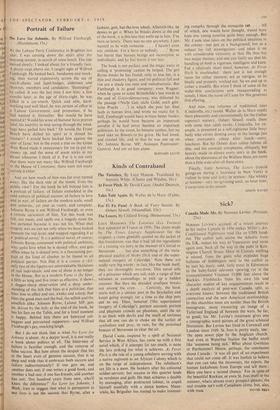Kinds of Contraband
The Tortoises. By Loys Masson. Translated by . 16s.)
Fee • Fi Fo Fun: -A Book of Fairy Stories. By Osbert Sitwell. (Macmillan. 15s.)
The Losers. By Clifford Irving. (Heinemann, I5s.)
LOYS MASSON'S The Tortoises (Les Torittes) first appeared in France in 1956. The claim made by . The Times Literary Supplement for the original, a claim gleefully quoted on the jacket of this translation, was that it had 'all the ingredients of a rousing sea story in the manner of Conrad or Stevenson . . . but also something of the meta- physical quality. of Mohr Dick and of the super- natural imagery of Coleridge.' Now these are really very big words:' in fact, like the book itself, they are thoroughly overdone. This novel tells of a privateer which sets sail,- with a cargo of fine tortoises as camouflage, to pick tip a hidden treasure. But then the dreaded smallpox breaks out among the crew. . . Certainly, the book starts well in a sinister port in the Seychelles and keeps going strongly for a, time as the ship puts out to sea. Then, however ('the supernatural imagery of Coleridge'), portent succeeds portent and phantom crowds on phantom, until the air 'is so thick with devils and the smell of tortoises that all one can do is choke on the surfeit of symbolism and pray, in vain, for the promised breezes of Stevenson to clear the air.
David Caute, inspired by a spell of National Service in West Africa, has come up with a first novel which, if it attempts far too much, is none the less striking for what it achieves. At Fever Pitch is the talc of a young subaltern serving with a native regiment in an African Colony which is on the verge of independence. The subaltern's sex life is a mess. He hankers after his coloured soldier-servant; but success in this quarter leads to revulsion and guilt, He then achieves a double by 'managing, after protracted labour, to acquit himself manfully with a dance hostess. Mean- while, his Brigadier has started to make insinuat-
ing remarks through the mosquito net. . . . All of which, one would have thought, would have kept one young novelist quite busy enough. But Mr. Caute also takes on the political situation in the colony—not just as a background, but as a subject for full investigation--and takes it on with considerable virtuosity at that. He thus has two major themes: and one can fairly say that his handling of both is vigorous, intelligent and keen. For a relatively short novel, however, At Fever Pitch is overloaded : there just is not enough room for either element, sex or intrigue, to be finally and properly worked out. So we end up in rather a muddle. But when I think of some of the wafer-thin confections now masquerading as novels. I bless the name of Caute for this generous first offering.
And now, two volumes , of traditional tales (Cinderella. etc.) retold. Walter de la Mare retells them pleasantly and conventionally for the (rather superior) nursery. Osbert Sitwell retells them with some nice adult twists; Cinderella, for ex- ample, is presented as a self-righteous little busy- body who comes dusting away in the lounge just when everyone's asleep after lunch—sorry, luncheon. But Sir Osbert does rather labour all this; and his constant complaints, obliquely, but heavily made in almost every story in the book, about the dreariness of the Welfare State, are more than a little stale alter all these years.
Finally, froM America, The Losers (rancid goings-on during a heatwave in New York) is violent in tone and jerky in texture: like whisky at teatime—very invigorating until, an hour later, it turns sour in the mouth.
SIMON RAVEN






































 Previous page
Previous page